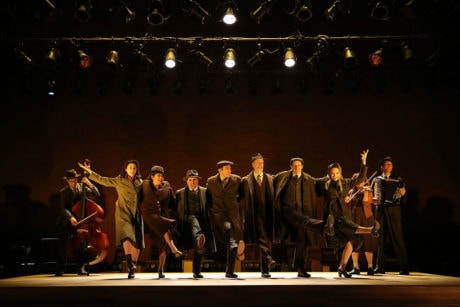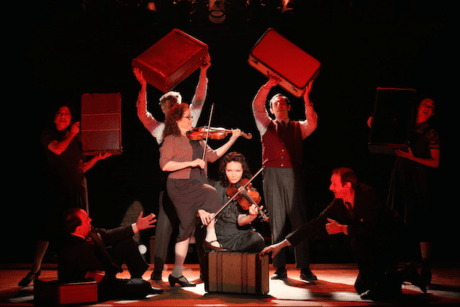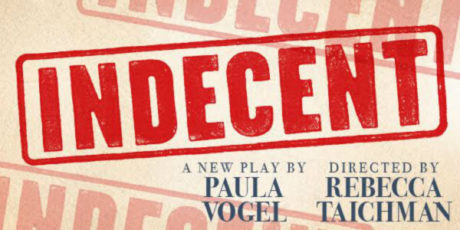Playwright Paula Vogel has been writing plays for almost forty years, in which she has dealt with issues that fueled her life. She’s been particularly interested in exploring the need for theatre to “wound our memory so we can remember.” Born in 1951, when she was just fifteen she journeyed to the Library of Congress where she would ask for out-of-print novels from the 1920s, 30s, 40s dealing with lesbian life, but she found only dismay because they all seemed to involve heroines whose final cries were basically “why can’t I be normal?.” Then one of her professors suggested she read “God of Vengeance” by Sholem Asch. She did, and was shocked to find that the author, a young married man, had written a beautiful scene between two women, a scene filled with purity, dignity and great sensuality. Combined with a scene that desecrated the Torah, one that enraged many Jews, Ms. Vogel never forgot it.

Some twenty years later, in the early 1980s a young director, Rebecca Taichman, was discovering an out-of-print copy of the same play. She was equally struck by it and was determined to stage the story of the 1923 obscenity trial which forced the original production on Broadway to close. In the years since, it had been largely forgotten except by people like Paula Vogel and Rebecca Taichman.
Ms. Vogel has won a Pulitzer (for How I Learned to Drive), two Obies, and the Drama Critics Circle Award and is firmly established as a major contributor to theatre via her eight other produced plays. After teaching for 30 years at Brown University and the Yale School of Drama, she is now conducting workshops at theatres, schools and community organizations. She has said: “Theatre has been my life” and clearly she’s been generous in sharing that life with us. Ms. Taichman’s credits are equally impressive and these two prominent women have co-created Indecent. Ms. Vogel wrote it, Ms. Taichman staged it along with choreographer David Dorfman and their devotion and dedication are apparent throughout the 90-minute evening.
The play itself dares to spin itself out in a very free form, almost as a cabaret performance. Its cast consists of 7 excellent actors and 3 gifted musicians, one each on the clarinet and the whistle, another on the violin, and a third on the accordion, ukelele and percussion. Gifted indeed, for they make beautiful music, often while singing and feverishly dancing everything from an exuberant hora which includes much hugging, arm waving and jumping about, often all three while scampering through a circle while continuing to supply music. They and the actors who join them certainly liven things up when the dark tale requires it.
As the Narrator Lemml the Stage Manager tell us up front, “we have a story to tell”, and it will be the story of the newsworthy reception to the play’s 1922 staging off Broadway and its move to the Apollo on Broadway on February 19, 1923. The cast was arrested, allowed to return to the theatre during the trial, but forced to close just 4 weeks later when it was found guilty of indecency. An amusing side note is that Mae West suffered a similar fate with her play The Pleasure Man, which closed after two performances in 1931, following a police raid and a prison visit for Ms. West, also causing disruption and a great boost to Mae West who soon after became the highest paid star at Paramount Pictures. Such luck did not follow Sholom Asch and his company.

Paula Vogel’s play takes itself very seriously, and is certainly an eye opener into some of the odious customs in the entertainment field. Can you imagine today if someone on stage raised a copy of The Koran above his head, hurled abuse at it, then flung it to the floor and stomped on it! That happened with The Torah in God of Vengeance and Ms. Vogel showed it to us at least three times to be certain we got the power of it.
The scene that the critics found equally unconscionable was the one in which the brothel owner’s daughter falls rapturously in love with a prostitute and when the rain falls, and the girls are discovered dancing joyously and with consummate passion in nothing but their flimsy night dresses. Not only is her father enraged, but clearly so was much of the public and all of the police in the district. It’s powerful to watch even now, though to me its repetition three times seemed to me at least one time too many.
Ms. Taichman presents many moving moments, among them the sight of the company seated against a back wall as the audience gathers, only to rise and shred dust from beneath their clothes, indicating the vile times in which they lived (and in which we still live?). The evening’s constant conflicts over sexuality and religion are sad reminders of the world in which we live today, and gives the play tremendous relevance. It’s difficult to single out performances, because the actors play many roles, and in fact each is listed in the program as “Actor”, not as any particular characters.
I respect what is up there onstage at Broadway’s Cort Theatre. I admire the work of each element in the production, but I remained somewhat outside of it most of the time, as an observer more than as a participant. It doesn’t tell us of a time of which we should be proud, but it serves to ask us to do what we can to finally rid ourselves of our seeming need to live within our own little worlds, for growth and understanding of those who are different from us will never come to us if we remain contained.
Indecent plays at the Cort Theatre – 138 West 48th Street, in New York, NY. For tickets, call Telecharge at or purchase them online.





